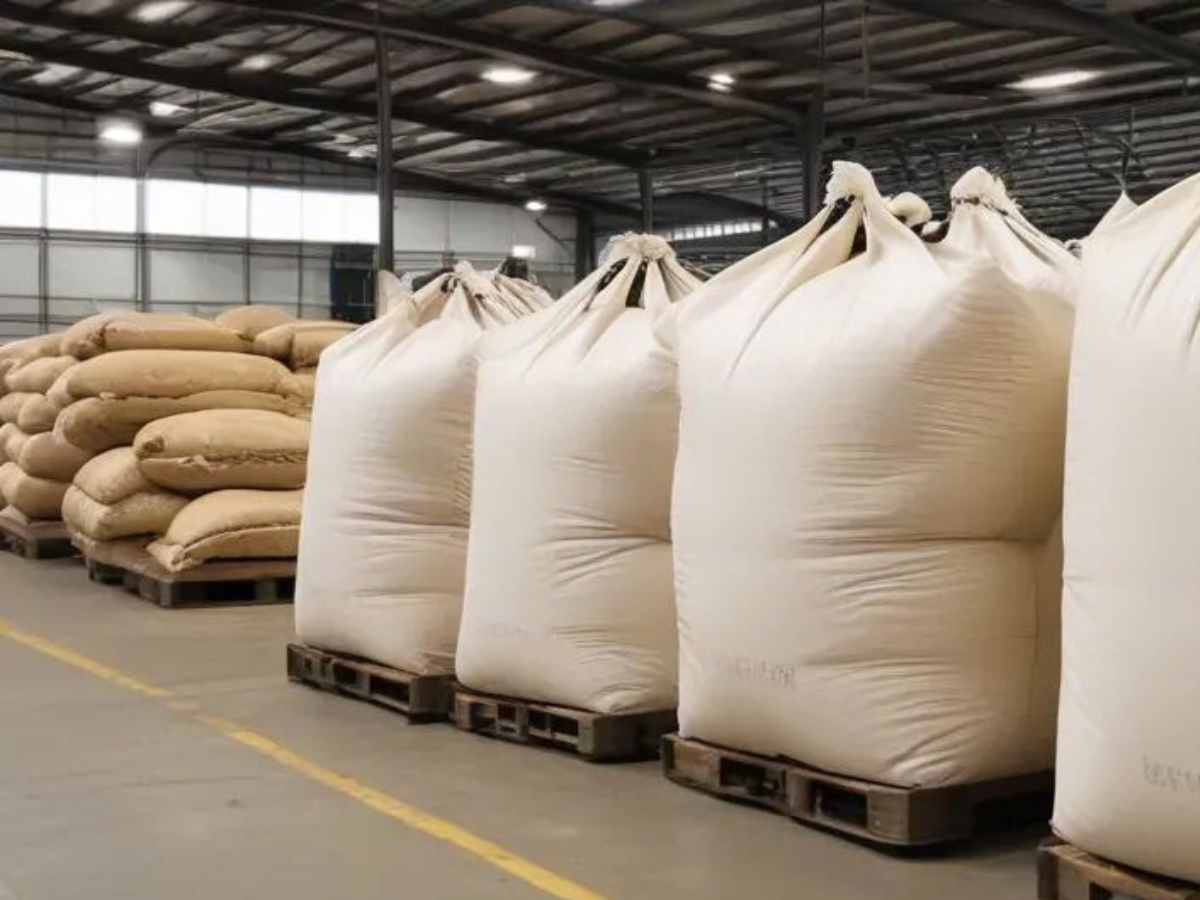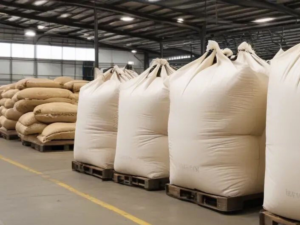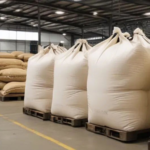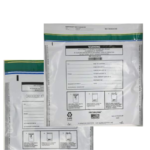
A Guide to Utilizing Bulk Bags in Agriculture: Making Farming Effortless

Bulk bags or flexible intermediate bulk containers (FIBCs) are one of the important tools used in farming practices.
These large, sturdy bags offer a range of benefits for farmers, from storing and transporting crops to organizing farm materials.
Here we’ll explore how farmers can effectively utilize bulk bags in various aspects of agriculture, making farming tasks easier and more efficient.
Understanding Bulk Bags
Bulk bags are large containers made from woven polypropylene fabric, capable of holding a considerable amount of material, typically ranging from 500 to 2,000 kilograms.
They come in various sizes and configurations, including different lifting options such as lift loops, spouts, or sleeves, making them versatile for different applications.
Generally, these bags are used for storing and transporting dry farming materials such as seeds, grains, fertilizers, and animal feed.
Benefits of Using Bulk Bags in Agriculture
Cost-Effective Storage and Transport:
Bulk bags offer a cost-effective solution for storing and transporting agricultural products. They minimize the need for traditional packaging materials such as boxes, crates, or sacks, reducing packaging costs and saving valuable storage space.
Efficient Handling:
With their large capacity and built-in lifting mechanisms, bulk bags facilitate the efficient handling of agricultural materials. These bags can be lifted, filled, and transported using cranes, forklifts, or other material-handling equipment.
Space Optimization:
Bulk bags help optimize storage space on farms by allowing vertical stacking, thereby maximizing warehouse or storage capacity. Their compact design and ability to be stored in tight spaces make them ideal for farms with limited storage areas.
Protection from Contamination:
Bulk bags provide a protective barrier against contamination. It safeguards agricultural products from exposure to moisture, pests, and other environmental factors. As a result, it leads to improved product quality and longer shelf life.
Versatility:
Bulk bags are versatile and can be used for a wide range of agricultural applications. Examples include storing, transporting, and handling various materials such as grains, seeds, fertilizers, and animal feed.
Practical Applications of Bulk Bags in Agriculture
Grain Storage:
Grain storage is a critical aspect of farming, especially during harvest seasons.
Bulk bags are an ideal solution for storing grains such as corn, rice, barley, and wheat.
Farmers can fill bulk bags directly from harvesting equipment or transfer grains from traditional storage bins to bulk bags for long-term storage.
With their large capacity and sturdy construction, bulk bags offer a convenient and space-saving storage option for grains, helping farmers maximize their storage space and protect their valuable harvests from pests and moisture.
Seed Transportation:
Transporting seeds from processing facilities to farms can be a logistical challenge for farmers.
Bulk bags offer an efficient way to transport seeds in bulk quantities, reducing the need for multiple trips and packaging materials. Seeds can be loaded into bulk bags at the processing plant and transported to farms without the hassle of individual packaging.
Additionally, bulk bags protect seeds from damage during transit, ensuring they arrive at the farm in optimal condition for planting.
This not only saves time and labor but also minimizes waste. This way, it makes seed transportation more eco-friendly.
Fertilizer Handling:
Bulk bags are ideal for handling and storing fertilizers such as urea, ammonium nitrate, and potassium chloride.
Farmers can purchase fertilizers in bulk and store them in bulk bags for easy access and distribution during planting seasons.
Bulk bags not only simplify the process of handling and transporting fertilizers but also help prevent moisture absorption and contamination, ensuring the effectiveness of the fertilizers when applied to the soil.
Animal Feed Storage:
Livestock farmers rely on high-quality feed to maintain the health and productivity of their animals.
Bulk bags provide a convenient and hygienic storage solution for storing and transporting animal feed, including pellets, grains, and hay.
The large capacity of bulk bags allows farmers to purchase feed in bulk quantities and store it safely on the farm.
By protecting feed from moisture, pests, and contamination, bulk bags help ensure the quality and freshness of the feed, resulting in healthier and more productive livestock.
Organic Waste Management:
Effective waste management is paramount for maintaining a healthy and clean farm environment.
Bulk bags can be utilized for collecting and transporting organic waste materials such as compost, manure, and mulch. They can contain organic waste and prevent leakage during transportation, thanks to their durable construction and capacity.
By using bulk bags for organic waste management, farmers can streamline the process of waste collection and disposal, reducing odors and minimizing environmental impact.
Tips for Using Bulk Bags Effectively in Agriculture
Proper Handling:
Ensure proper handling of bulk bags to prevent damage and ensure product integrity.
Make sure to use the right lifting equipment to minimize the risk of accidents or injuries.
Quality Assurance:
Inspect bulk bags for any defects or damage before filling them with agricultural products. Ensure that the bags are clean, intact, and free from tears or punctures to prevent contamination or spillage.
Storage Conditions:
To preserve product quality, store bulk bags in a spotless, dry, and well-ventilated location. Steer clear of exposure to intense heat, dampness, or direct sunshine since they can deteriorate the materials and compromise the integrity of the product.
Labeling and Documentation:
For simple identification and traceability, mark bulk bags with pertinent information such as product kind, batch number, and expiration date.
Maintain accurate documentation of product inventory and usage to track quantities and monitor stock levels.
Disposal and Recycling:
Dispose of empty bulk bags responsibly by following local regulations and guidelines for waste disposal. Consider recycling options for used bulk bags to minimize environmental impact and promote sustainability.
The Bottom Line:
Bulk bags are valuable tools for modern agriculture, offering numerous benefits for farmers in terms of storage, transportation, and handling of agricultural products.
By understanding the advantages of bulk bags and implementing effective strategies for their use, farmers can streamline farm operations, reduce costs, and optimize productivity.
Whether it’s storing grains, transporting seeds, handling fertilizers, or managing organic waste, bulk bags provide a versatile and cost-effective solution for a wide range of agricultural applications.
Using bulk bags in Agriculture can improve farming methods’ sustainability and efficiency, which will ultimately increase the productivity and profitability of agricultural businesses.
Share:
Get A Quick Quote
Social Media
Most Popular
Categories
Tags
Related Posts

The Ultimate Guide to Organizing and Storing Soil Bags
If you’re a gardening enthusiast, you know how important it is to have good-quality soil for your plants to thrive. Soil bags, whether they be

A Guide to Utilizing Bulk Bags in Agriculture: Making Farming Effortless
Bulk bags or flexible intermediate bulk containers (FIBCs) are one of the important tools used in farming practices. These large, sturdy bags offer a range

Clear Poly Mailer Bags: The Ultimate Shipping Upgrade
Shipping is a challenging aspect in the world of e-commerce. Some products like glass items, electronics, and artwork are more fragile than others. As a



